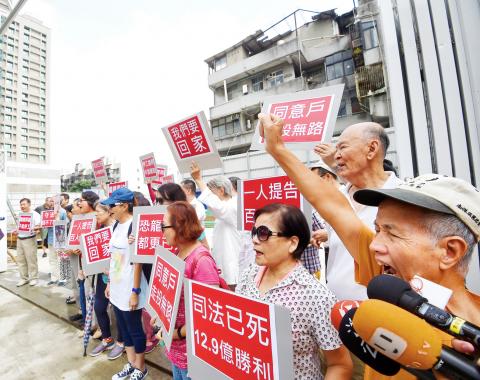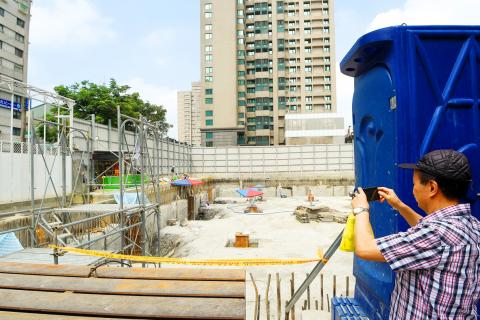Landowners supporting an urban renewal project in Taipei’s Yongchun Community (永春) yesterday protested the Supreme Administrative Court’s decision to uphold an earlier ruling against the Taipei City Government.
The initial ruling in the 16-year-old case said that Taipei’s approval of changes to building plans for the urban renewal project in Xinyi District (信義) filed by Senyeh Construction Co (森葉營造建設) in 2014 were illegal.
It is unacceptable that the rights and interests of the 99 percent of landowners who agreed to the project are trampled by the refusal of the minority, just one family, protesters said.

Photo: Fang Pin-chao, Taipei Times
One protester said her family agreed to the project because her father had found it increasingly difficult to climb the stairs in their building, but her father died 10 years ago and the project has still not begun.
Her mother criticized the city government, saying she agreed to the project because she believed that only 80 percent of owners whose land would be used for the new construction had to agree for the project to move forward.
She said she does not understand how it is illegal to enforce tearing down houses after the Wang (王) family incident in Shilin District (士林), calling on the city government to “take responsibility and stop playing politics.”

Photo: Fang Pin-chao, Taipei Times
The Wang incident refers to the Wenlin Yuan (文林苑) urban renewal project, in which Wang Kuang-shu (王廣樹) did not agree to his land being used and filed lawsuits after the forced demolition of his house.
The High Administrative Court dismissed Wang’s claims and ordered that his land be included in the project, as his property was not on a roadside and there was not enough room to build a house on it should it be excluded.
The Wang family in 2014 negotiated an out-of-court settlement with the developer.
Taipei Mayor Ko Wen-je (柯文哲) yesterday said that the city would continue to promote urban renewal projects.
The city government has passed a bill authorizing a settlement system for opponents of projects, Ko said, adding that it would establish a task force to handle complaints that predate the system, such as the Yongchun project.
As Senyeh had already removed buildings occupied by opponents of the project and begun construction when the Supreme Administrative Court upheld the ruling, the city government needs to call for a change to building plans, revoke building permits and temporarily halt construction, Ko said.
However, urban renewal projects in Taipei must continue, not only for the sake of the city’s aesthetics, but also for the safety of its residents, he added.
The ruling did not entirely shut down the Yongchun project, Taipei Deputy Mayor Charles Lin (林欽榮) said in a statement, but it would drag out the process even longer.
The task force would finalize all administrative proceedings in accordance with the Supreme Administrative Court’s ruling, Lin said.
Additional reporting by CNA

GLOBAL ISSUE: If China annexes Taiwan, ‘it will not stop its expansion there, as it only becomes stronger and has more force to expand further,’ the president said China’s military and diplomatic expansion is not a sole issue for Taiwan, but one that risks world peace, President William Lai (賴清德) said yesterday, adding that Taiwan would stand with the alliance of democratic countries to preserve peace through deterrence. Lai made the remark in an exclusive interview with the Chinese-language Liberty Times (sister paper of the Taipei Times). “China is strategically pushing forward to change the international order,” Lai said, adding that China established the Asia Infrastructure Investment Bank, launched the Belt and Road Initiative, and pushed for yuan internationalization, because it wants to replace the democratic rules-based international

ECONOMIC BOOST: Should the more than 23 million people eligible for the NT$10,000 handouts spend them the same way as in 2023, GDP could rise 0.5 percent, an official said Universal cash handouts of NT$10,000 (US$330) are to be disbursed late next month at the earliest — including to permanent residents and foreign residents married to Taiwanese — pending legislative approval, the Ministry of Finance said yesterday. The Executive Yuan yesterday approved the Special Act for Strengthening Economic, Social and National Security Resilience in Response to International Circumstances (因應國際情勢強化經濟社會及民生國安韌性特別條例). The NT$550 billion special budget includes NT$236 billion for the cash handouts, plus an additional NT$20 billion set aside as reserve funds, expected to be used to support industries. Handouts might begin one month after the bill is promulgated and would be completed within

The National Development Council (NDC) yesterday unveiled details of new regulations that ease restrictions on foreigners working or living in Taiwan, as part of a bid to attract skilled workers from abroad. The regulations, which could go into effect in the first quarter of next year, stem from amendments to the Act for the Recruitment and Employment of Foreign Professionals (外國專業人才延攬及僱用法) passed by lawmakers on Aug. 29. Students categorized as “overseas compatriots” would be allowed to stay and work in Taiwan in the two years after their graduation without obtaining additional permits, doing away with the evaluation process that is currently required,

RELEASED: Ko emerged from a courthouse before about 700 supporters, describing his year in custody as a period of ‘suffering’ and vowed to ‘not surrender’ Former Taiwan People’s Party (TPP) chairman Ko Wen-je (柯文哲) was released on NT$70 million (US$2.29 million) bail yesterday, bringing an end to his year-long incommunicado detention as he awaits trial on corruption charges. Under the conditions set by the Taipei District Court on Friday, Ko must remain at a registered address, wear a GPS-enabled ankle monitor and is prohibited from leaving the country. He is also barred from contacting codefendants or witnesses. After Ko’s wife, Peggy Chen (陳佩琪), posted bail, Ko was transported from the Taipei Detention Center to the Taipei District Court at 12:20pm, where he was fitted with the tracking